More actions
| Senet | |
|---|---|
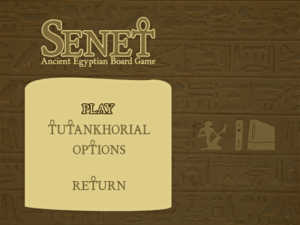 | |
| General | |
| Author | Pedrocrespo |
| Type | Board |
| Version | 0.05b |
| License | CC-BY-NC-ND-3.0 |
| Last Updated | 2009/07/10 |
| Links | |
| Download | |
| Website | |
Senet is a board game from ancient Egypt, dating back to around 3500 BC. It is considered to be the oldest confirmed board game in existence.
This is an adaptation of the board game for the Wii, made for the Scenery Beta 2009 (Wii Games).
User guide
(Game rules based on Spanish Wikipedia's) Senet is a two-player board game that dates back to ancient Egypt, with a confirmed existence of around 3500 BC.
- The objective of the game is to remove all of your pieces from the board before your opponent.
- The game is played on a board with three rows of ten squares each, and each player controls five conical or cylindrical pieces.
- The order of the squares is arranged in a specific pattern, with some squares designated as special squares.
- The game is played without the use of dice, but instead, four sticks are rolled to determine the movement of the pieces.
- Every time a player rolls a 1, 3, or 6, they get another turn.
- When two pieces from the same player are consecutive, they are protected, and three pieces form a barrier.
- Capturing an opponent's piece requires interchanging the positions of the capturing and captured pieces, but this can only be done when the captured piece is not protected.
- If a player is unable to move forward but can move backward, they must do so.
| Game start | Gameplay direction |
|---|---|
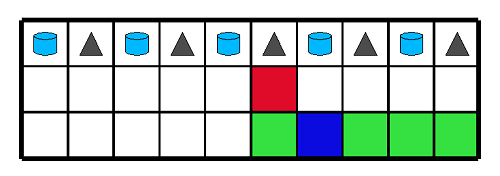
|
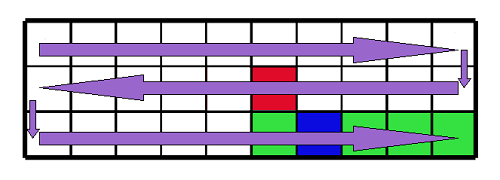
|
| Starting setup is shown, with special squares filled: green are protection squares, blue is the square that makes you move to the red one if you land on it. | Starting setup is shown, with special squares filled: green are protection squares, blue is the square that makes you move to the red one if you land on it. In this picture you can see the direction pieces must be moved while playing, except if they can't move this way, and have to move backwards instead. |
| Pieces protecting themselves | Barrier |
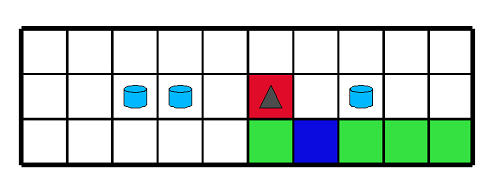
|
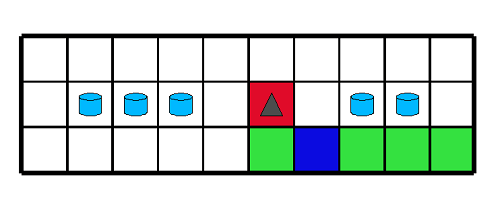
|
| If it is the conic piece's turn and he rolls a 2 or 3, he won't be able to move forwards, because the cylindrical pieces are next to each other and protected from being captured. So the conic piece would have to move backwards because it can. In this case, if he rolled a 2 he would capture the cylindrical piece two squares behind him, but this move wouldn't be beneficial to this player, because he would now have three opponent's pieces ahead. The conic piece could jump the opponent's pieces with a 4 or a 6, because there's no barrier. Of course, if he rolls a 1 he can move to the next square, because it's empty. | If it is the conic piece's turn, he won't be able to move forwards unless he scores a 1, because of the barrier of three cylindrical pieces preventing him from jumping over them but still allowing their owner to jump them. In this case (a roll other than 1), the conic piece would have to move backwards, but it only could do so by rolling a 4 or 6, because the cylindrical rear pieces are protecting themselves. If backward moving is not possible and this player hasn't any other movable piece on the board, he must pass his turn. |
Controls
Menu (Wiimote 1):
Pointer - Move pointer
A - Select item
D-Pad Up/Down - Move through menu, Continue reading in tutorial
In game (Wiimote 1 and 2):
Pointer - Move pointer
B - Roll the sticks
A - Select piece to move
Home - Quit game, Return to menu
Plus/Minus - Pass turn if a player can't move
Screenshots
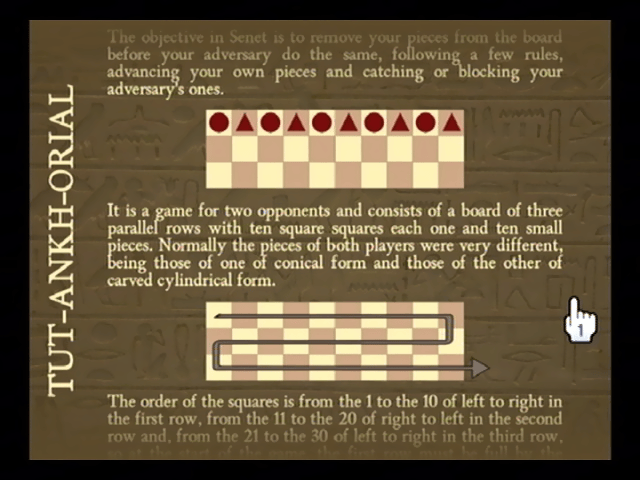
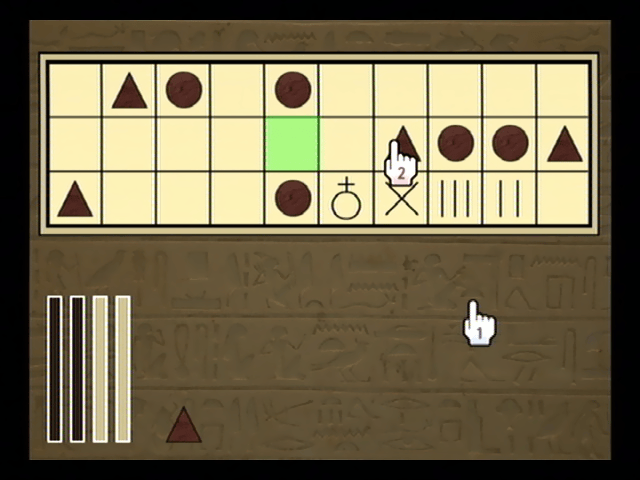
Media
How to Play Senet (EgyptologyLessons)
Changelog
v0.05b 2009/07/10
- Passing turn function has been fixed because it wasn't working properly. Please, let me know any bug you'd find. Suggestions are welcome too.
v0.05 2009/07/09
- It includes all the rules shown above but two:
- jumping multiple barriers isn't allowed.
- if advancing forward is not possible, move backwards if it is.
- A basic howtoplay tutorial (tut-ankh-orial) has been included too, but it's just this same page for now.
